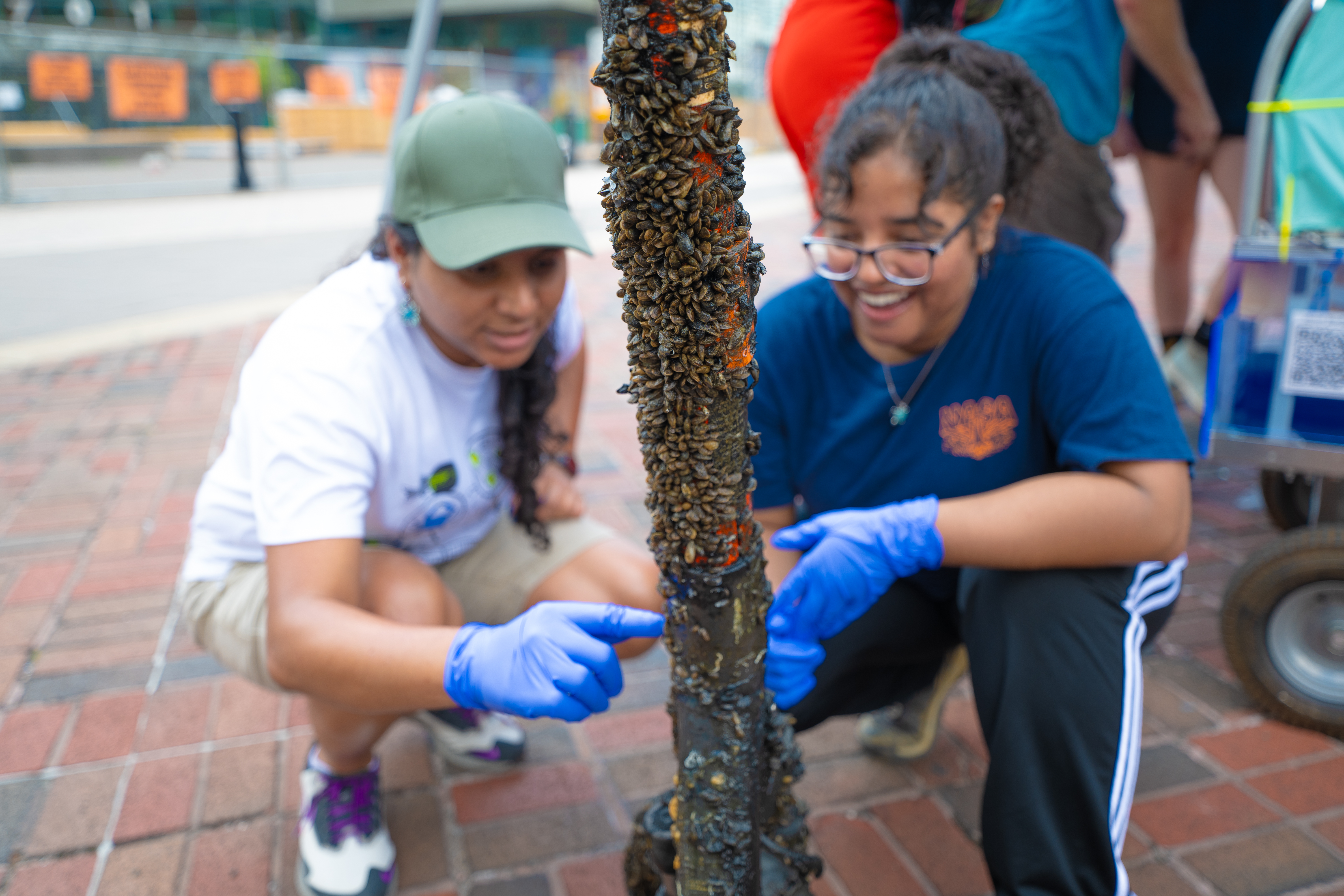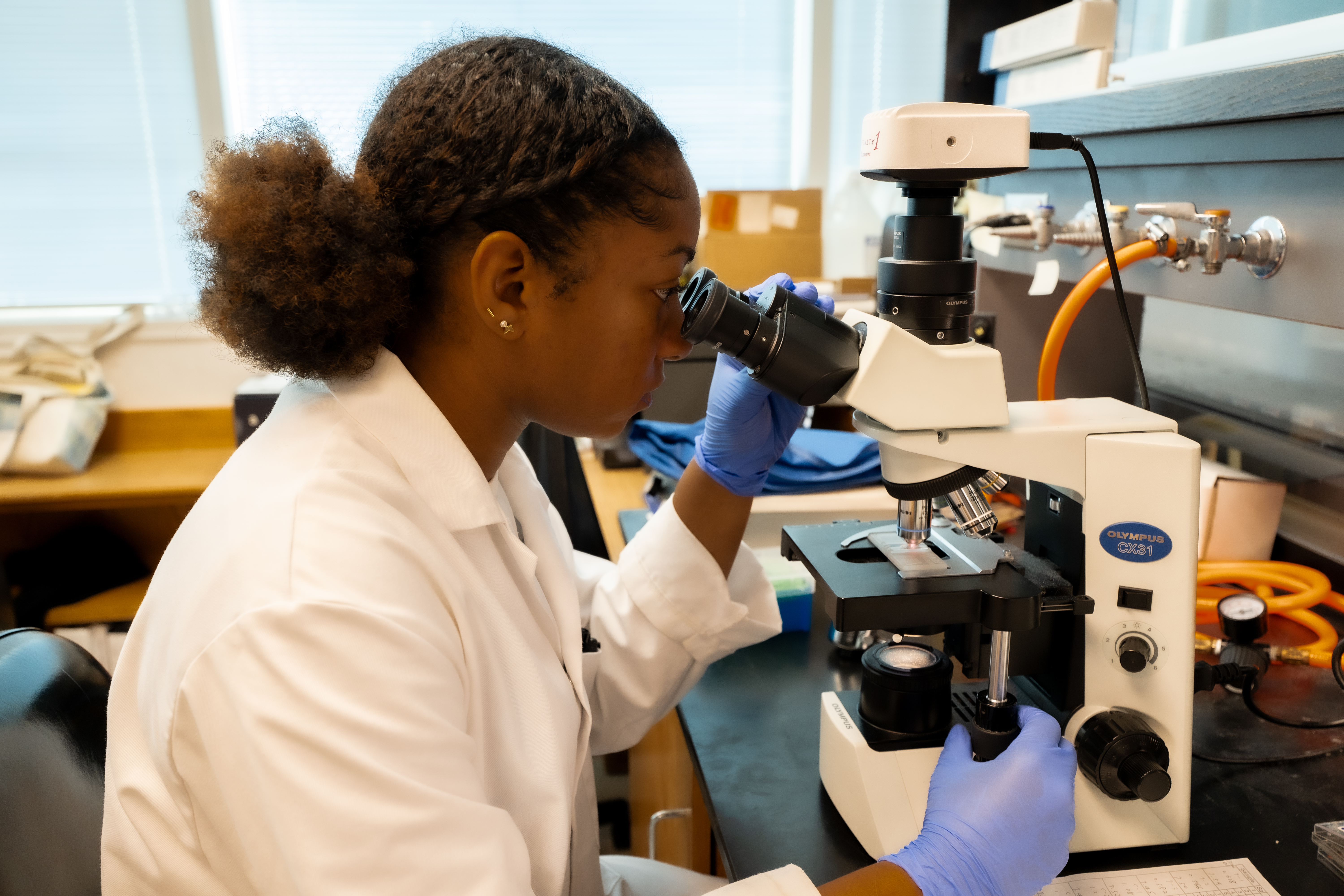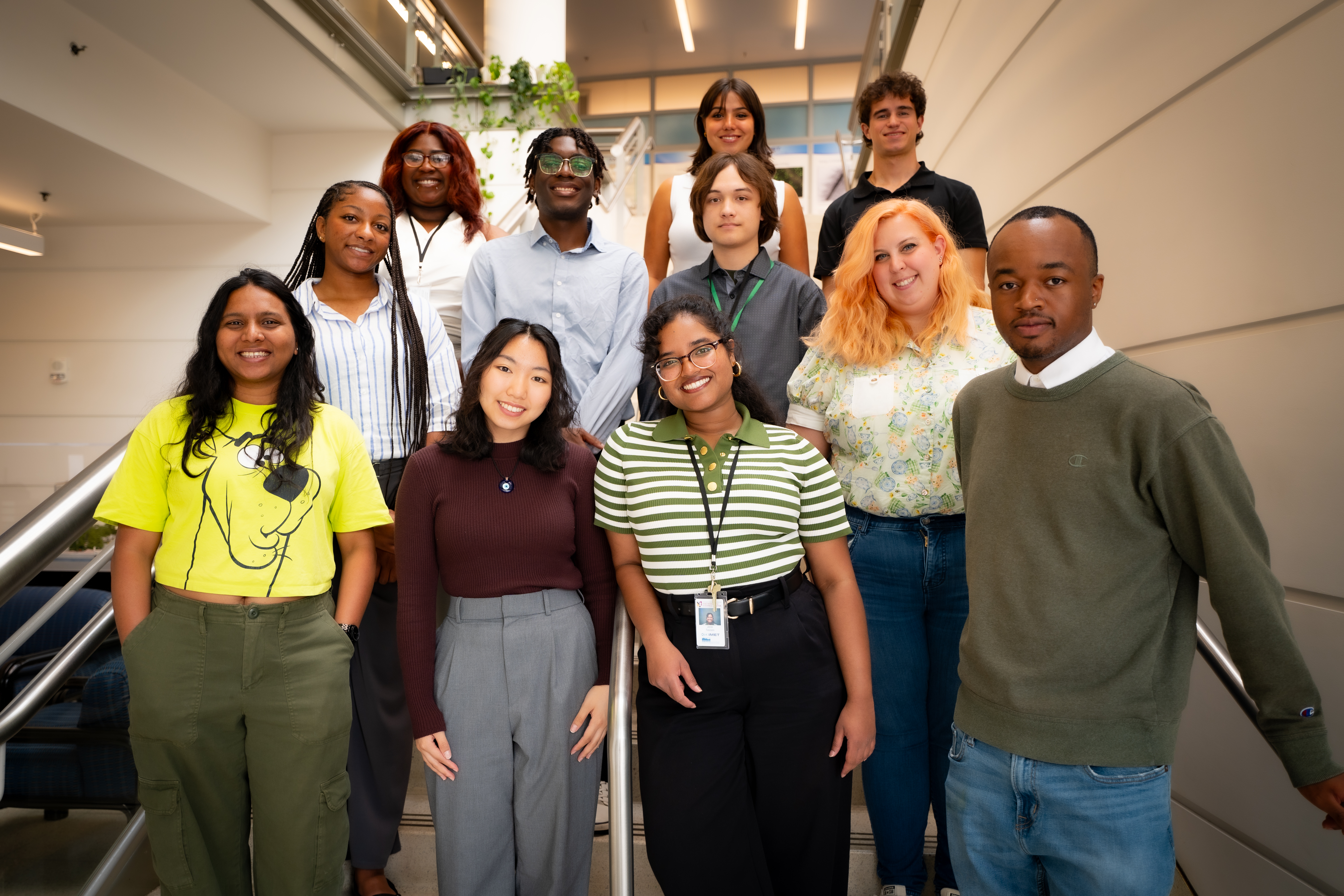First Drops, Fresh Starts: Kicking Off the 2025 IMET Summer Internship Program
The rain couldn’t dampen the energy at IMET as a new class of summer interns stepped into their first week. The interns arrived early and eager to begin a summer of immersive research, growth, and exploration.
Introductions:
The new summer interns were welcomed with a great presentation by IMET Director, Dr. Russell Hill. Dr. Eric Schott followed after the introduction and set the tone for the program with a heartfelt introduction that reminded the interns of the critical role they play in shaping the future of marine and environmental science.
The message was clear: the world needs their ideas, their questions, and their courage to seek solutions. After breakfast and introductions, the interns jumped into onboarding: sorting out paperwork, reviewing program expectations, and receiving their security and digital badges. They also took professional headshots to mark the beginning of their scientific journey.
From there, they toured the building, met their mentors, and stepped into the labs where their summer research will take shape.
A Legacy of Mentorship
The IMET Undergraduate Summer Internship Program has a legacy of equipping undergraduates with a focus on students from underrepresented or underserved backgrounds. For over 20 years we have provided undergraduates with the tools, mentorship, and research experience needed to thrive in science. Interns are matched with a Principal Investigator (PI) to work on a dedicated project in one of IMET’s three key focus areas:
- Sustainable Seafood Production
- Environment, Animal, and Human Health
- Energy, Water, and the Environment
Throughout the summer, interns will go beyond benchwork. Weekly seminars, field experiences, and creative science communication workshops round out their training, helping them grow not only as researchers but as well-rounded science professionals.
The summer interns wrapped up their first week with an immersive Eco Tour led by the Waterfront Partnership, offering a new lens through which to view Baltimore’s harbor, one that connected science, sustainability, and community. As they walked along the waterfront, they saw real-world examples of environmental challenges and innovative solutions, reinforcing the importance of the work they’re beginning at IMET.
Here are our 2025 interns!
Name: Jerin Tasnim
School: SUNY Stony Brook University
School Year: Graduated May 2025
Major: Marine Vertebrate Biology with a Journalism minor
From: New York, NY
Mentor: Danielle Staggers
Current Career Goal: No matter what I do I am always in pursuit to be a catalyst for conservation of wildlife and wild places by driving meaningful, lasting change for a healthier planet and future generations.
Name: Ka'Turra Copeland
School: Tuskegee University
School Year: Rising Junior
Major: Animal science (wildlife track)
From: Tallahassee, Florida
Mentor: Dr. Ting Yeh
Current Career Goal: Gaining my DVM and a Phd in Veterinary Pathology
Name: Mikaela Gonzalez
School: Swarthmore College
School Year: Rising Senior, Class of 2026
Major: Environmental Studies
From: El Paso, Texas
Mentor: Ally Kido
Current Career Goal: Ecologist and Marine Conservationist
Name: Beth Casagrande
School: Towson University
School Year: Rising Senior for Bachelor's / First year Master's
Major: Environmental Science with a minor in Environmental Sustainability
From: Baltimore, MD
Mentor: Dr. Eric Schott
Current Career Goal: Chesapeake Bay and wetland conservation
Name: Joseph Lenzo
School: University of Delaware
School Year: Senior
Major: Environmental Science
From: Hightstown, NJ
Mentor: Vijay Hemmadi
Current Career Goal: Make a genuine difference in the environment, particularly in marine and estuary systems, through field work and research.
Name: Shudan Jew
School: Loyola University Maryland
School Year: Rising Junior/ 2027
Major: BioHealth, Concentration in Biotech & Biopharma
From: Bel Air, Maryland
Mentor: Dr. Tsetso Bachvaroff
Current Career Goal: Patent Lawyer
Name: Desmond Seybold
School: UMBC
School Year: Sophomore
Major: Biochemistry
From: Ellicott City, Maryland
Mentor: Dr. Ting Yeh
Current Career Goal: To earn a PhD in genetics.
School: Stony Brook University
School Year: Rising Senior
Major: Marine Sciences with a minor in Ecosystems & Human Impact
From: Staten Island, NY
Mentor: Dr.Russell Hill
Current Career Goal: I want pursue a MD/Ph.D in Microbiology and build a career around biomedical research. I'm really passionate in lab-based research and studying microbes in context of disease prevention! I hope to work in a lab and contribute to research that can save lives.
School: University of Maryland Eastern Shore
School Year: Junior
Major: Environmental Science with a concentration in Marine Science
From: Laurel, Maryland
Mentor: Dr. Yi-Ying Li
Current Career Goal: My academic interests include marine ecotoxicology, molecular ecology, environmental management, and policy. I aspire to pursue a Ph.D. in Environmental Molecular Biology and Biotechnology.
Name: Shamar Dennis
School: Morgan State University.
School Year: Rising Senior
Major: Biology with a minor in Chemistry
From: New Jersey
Mentor: Dr. Djik Maouyo
Current Career Goal: I plan on pursuing a career in the environmental health field
Week 2: Science Speaks! Finding Poetry in Research
Though Week 2 was shortened in observance of the Juneteenth holiday, IMET’s summer interns made the most of each moment. This week, the interns had plenty of time to settle into their labs.
Monday through Wednesday and again on Friday morning, interns worked alongside their mentors, building momentum in their research projects. They began applying foundational lab skills, asking deeper questions, and becoming more familiar with the tools and techniques unique to their research areas.
The highlight of the week came Friday afternoon during the Poetry in Science Workshop led by Dr. Kate Gillespie. Far from a typical seminar, this session invited interns to stretch beyond the technical and into the emotional.
Designed to help scientists connect with public audiences, the workshop guided students through a process of distilling dense scientific abstracts into poetic language that resonates across disciplines and backgrounds.
Interns began by identifying words that expressed feeling and curiosity. the interns we also tasked to remove jargon that often makes science inaccessible. What remained were phrases that revealed the beauty, tension, and wonder within their work. Complex research transformed into lyrical expression, reminding everyone that science is not just about data, but about storytelling, connection, and shared meaning.
Here is what Beth had to say about the workshop:
The poetry workshop was so much fun! It was a great way to let out our creative side which we don't always get to do in the science field. It helped me look at my project from a new perspective, through an artistic lens.
As the interns look ahead to Week 3, they carry not just growing lab skills, but also the language to communicate the why behind their work and how to connect creatively.
Week 3: Telling the Story of Science
Week 3 of the IMET Summer Internship Program was all about building one of the most underrated skills in a scientist’s toolkit: communication. While the interns continued to make steady progress in their lab work on Monday, Thursday, and Friday, the real spotlight of the week came from a two-day intensive workshop designed to transform how they share their science with the world.
On Tuesday and Wednesday, they joined the IAN Science Communication Workshop. The goal was simple: make science easy to understand. Interns learned how to focus their message, avoid jargon, and design better visuals. From 9:00 AM to 3:30 PM each day, the interns explored strategies for simplifying technical content without sacrificing accuracy. They learned how to identify key messages, design effective visuals, and structure communication that resonates with both expert and non-expert audiences. Hands-on activities and real-time feedback kept the energy high and the learning practical.
They practiced writing for people who don’t work in science. They asked questions and got direct feedback. The workshop lasted all day, but the energy stayed high. Interns worked in groups, shared ideas, and gave each other tips. On Monday, Thursday, and Friday, interns stayed in the lab. They kept building skills and asking new questions.
By the end of the week, they knew more about their research and how to talk about it.
Week 4 will bring more time in the lab. Now, they’re ready to do the work and explain why it matters.
The communications workshop was very informative and a little bit fun besides the difficulty.
Week 4: Career Talks and Lab Work
With the fourth of July holiday approaching, Week 4 was short, but full of new and exciting things !
Now fully comfortable in their labs, the interns spent most of the week in the lab, moving deeper into their projects.
On Tuesday, the interns had an opportunity to have a one-on-one with the program coordinator. It was a chance to ask questions and stay on track.
Wednesday brought a break from the bench. The group joined a Bench to Business workshop and career talk. Two guest speakers shared how they moved from lab research into business and biotech roles. The interns were excited to ask about career paths, daily work life, and how to plan ahead. The session was honest and helpful for many. Here is what Mikaela Gonzalez had to say:
" Often, science is posed as a separate field from the world of entrepreneurship. The speakers in the Bench to Business Workshop helped me to understand that working in a lab can still be interdisciplinary, and that the insight gained from hands-on science can feasibly be connected to creating an accessible, real-world business model. I learned so much from the testimonies of Dr. Nina Lamba and Dr. Ting Yeh about how they have learned to navigate the world of scientific entrepreneurship. "
Week 5: Magnet Fishing, and Making Connections

Week 5 starts off steady, with interns digging deeper into lab work and checking in with the program coordinator to track progress.
But Friday is when the adventure began…
IMET hosted a joint intern social with partners from the National Aquarium, Morgan State PEARL, BGE and Maryland Sea Grant. The day began with a welcome and IMET overview, giving visiting students a chance to learn about the research happening inside the institute.
Interns took part in scooter magnet fishing with the National Aquarium team. They headed to the water’s edge, magnets in hand, ready to pull debris from the harbor. The goal: learn more about marine pollution and how simple actions can support local ecosystems. It was hands-on, muddy, and unforgettable.
One group even pulled an entire wheelchair from the harbor ! This was an unexpected catch that drew gasps and applause from curious onlookers passing by the waterfront.
After drying off and changing clothes, the group came together for lunch and a career panel featuring STEM professionals. Speakers shared honest stories about their paths into science—from research to industry to education. Interns asked sharp questions and left with useful insight.
The day ended with guided IMET lab tours, giving guests from Morgan and the Aquarium a closer look at the projects IMET interns are leading this summer.
Week 6: Head Down, Eyes Ahead

After the fun filled event from week five, Week six was focused and productive. With final presentations coming up, interns stayed locked into their research.
Most of the week was spent in the lab. Interns ran experiments, collected data, and sharpened their techniques. There was a shift. They were starting to lead their projects with confidence and learned skill.
On Tuesday, interns attended a career talk with Djik Maouyo during lunch. He spoke about building a path in science and shared advice on staying flexible in a changing field. Interns asked about grad school, job options, and how to find work that makes a difference.
The rest of the week was quiet. Lab notebooks filled and fully in focus.
Week 7: Eyes on the Horizon
After weeks of focused research, Week 7 was filled with both productivity and anticipation. The interns continued pushing forward on their projects, making steady progress in the lab. Here is what Mikaela is working on:
Mikaela Gonzelez
Biodiversity in Submerged Aquatic Vegetation Habitats at Otter Point Creek
Submerged Aquatic Vegetation (SAV) - like bay grasses and sea weeds - provide many important ecosystem services in the Chesapeake Bay, and provide habitat to underwater organisms. However, SAV populations are highly susceptible to changes in the water, and as urbanization in land use near the Chesapeake Bay has drastically increased in recent decades, nutrient runoff has significantly altered aquatic ecosystems. Therefore, my experiment utilizes eDNA and traditional survey methods to comparatively analyze the difference in biodiversity levels between SAV and non-SAV habitats within Otter Point Creek — a tributary of the Chesapeake Bay.
Ka'Turra Copeland and Desmond Seybold
p14 and p7 Binding to satRNA and Iron in Trichomonas vaginalis Virus
Trichomonas vaginalis, the parasite that causes trichomoniasis, hosts five viruses that influence its growth and disease-causing ability. These viruses carry three small satellite RNAs (S1, T1, and S1’) that produce proteins, including p14 and p7. Our project confirmed that these RNAs make the proteins and tested whether the proteins bind to RNA and if iron can block this binding.
On Friday, the interns enjoyed a field trip that included much rest and relaxation. Many interns said that this field trip was beautiful, well needed and gave them an opportunity to be refreshed and ready for week 8. Enjoy this photo of 2025 interns Jayson and Desmond.
Weeks 7 & 8: The Home Stretch
After weeks of steady progress in the labs, the interns shifted their focus toward presentations. Weeks 8 and 9 were filled with focus and preparation as interns wrapped up their summer research. Much of the time was spent in the labs, putting the final touches on projects and preparing for the official presentations on August 7. While some students shared that their results did not match their expectations, they recognized this as part of the research process and a valuable learning experience.
In Week 8, interns balanced long lab hours with opportunities for guidance and feedback. On Tuesday, they joined the Graduate Student Panel, a chance to hear about life in graduate school while sharing lunch and snacks together. By Friday, everyone gathered in the boardroom for a presentation review, using the afternoon to polish slides, strengthen delivery, and support each other ahead of the big day.
Presentation Week !
Week 9 brought the final push. Interns completed evaluation forms and program surveys, then had multiple chances to rehearse presentations in the MPR. Thursday marked the culmination of their hard work: Research Presentation Day. With lunch provided, interns proudly shared their summer projects and reflected on how much they had grown. Friday was set aside as a free day to rest and prepare for departure, and by Saturday, students moved out—closing the chapter on an intense and rewarding summer.
A huge thank you to Ronita Sequeira and Chenira Smith for the dedication and passion they bring to the IMET Summer Internship Program. Their support has been invaluable, and the interns are deeply grateful for the guidance and care they’ve received. So much happens behind the scenes to make this experience possible, and Ronita and Chenira handle it all with commitment and excellence. Until next year!

